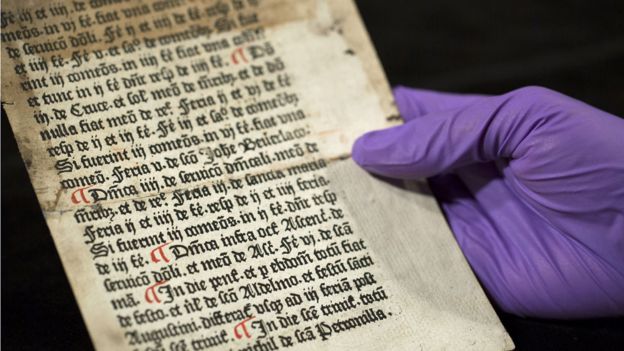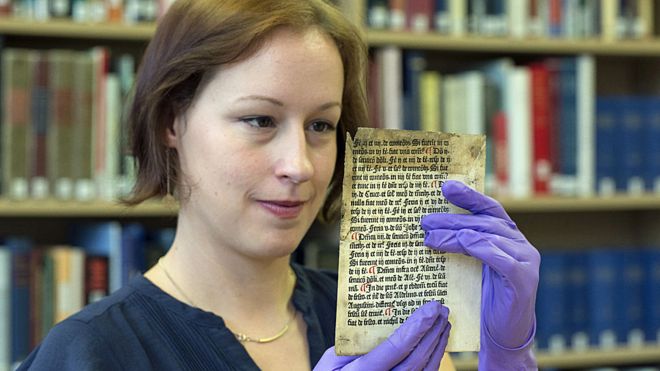The unexpected discovery of this extremely rare medieval text now has scholars salivating.

University of ReadingThere are no other known surviving copies of these William Caxton pages from 1476.
Recently uncovered pages dating back to 1476 belonged to one of the first books ever printed in England, experts have confirmed.
Written in bold, red, and black Latin, the text was — appropriately enough — discovered by a librarian at the University of Reading.
Erika Delbeccque was sorting through a box of archives when she noticed the aged, double-sided paper.
Luckily, she had the expertise to recognize the signs of medieval typography.
“I suspected it was special as soon as I saw it,” she is quoted as saying in a university press release. “The trademark blackletter typeface, layout and red paragraph marks indicate it is very early western European printing.”
The extremely rare pages, which came from a religious handbook titled Sarum Ordinal, “had previously been pasted into another book for the undignified purpose of reinforcing its spine,” Delbeccque said.
The leaflet is thought to have been saved from that unfortunate fate by a University of Cambridge librarian in 1820. With no one realizing its significance, the paper was added to the collection of typographer John Lewis.
It was later purchased, along with the rest of Lewis’s collection, by the University of Reading in 1997 — only to be put away for nearly 20 years with thousands of other archived items.
“It is incredibly rare to find an unknown Caxton leaf, and astonishing that it has been under our noses for so long,” Delbeccque said.

University of ReadingLibrarian Erika Delbeccque made the discovery.
The book from which the pages came — which served as a handbook for medieval priests — was printed by William Caxton, the man credited with introducing the printing press to England.
Caxton is thought to have printed the first ever English verses of the Bible, the first English translation of Aesop’s Fables, and one of the earliest editions of Chaucer’s Canterbury Tales.
Caxton’s notoriety (he was named one of the “100 Greatest Britons” in a 2002 BBC poll) makes this latest discovery particularly exciting. No other copies of these new pages are thought to have survived.
The find is valued at around $130,000 (100,000 pounds) and will be on display from May 9 to May 30.
The leaflet is in surprisingly good condition “considering that it spent some 300 years bound in the spine of another book, and another 200 resting forgotten in an album of fragments rescued from other bindings,” Caxton expert Dr. Lotte Hellinga said.
Now, after so many years of being ignored, the piece is finally getting the attention that book-lovers think it deserves.
“In the world of rare books, certain words have special, almost magic, resonance, and Caxton is one of them,” Andrew Hunter, the specialist to evaluated the pages, said. “Thus the discovery of even a fragment from among Caxton’s earliest printing in England is thrilling to bibliophiles, and of great interest to scholars.”
Next, read about the 384-year-old shopping list recently discovered under the floorboards of a historic English home. Then, learn what people actually ate in medieval times.






